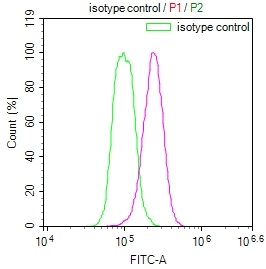FBLN7 Antibody, FITC conjugated
-
中文名称:FBLN7兔多克隆抗体, FITC偶联
-
货号:CSB-PA687502LC01HU
-
规格:¥880
-
其他:
产品详情
-
产品名称:Rabbit anti-Homo sapiens (Human) FBLN7 Polyclonal antibody
-
Uniprot No.:
-
基因名:FBLN7
-
别名:FBLN7 antibody; FBLN7_HUMAN antibody; FIBL-7 antibody; Fibl7 antibody; Fibulin-7 antibody; TM14 antibody
-
宿主:Rabbit
-
反应种属:Human
-
免疫原:Recombinant Human Fibulin-7 protein (25-393AA)
-
免疫原种属:Homo sapiens (Human)
-
标记方式:FITC
-
克隆类型:Polyclonal
-
抗体亚型:IgG
-
纯化方式:>95%, Protein G purified
-
浓度:It differs from different batches. Please contact us to confirm it.
-
保存缓冲液:Preservative: 0.03% Proclin 300
Constituents: 50% Glycerol, 0.01M PBS, PH 7.4 -
产品提供形式:Liquid
-
储存条件:Upon receipt, store at -20°C or -80°C. Avoid repeated freeze.
-
货期:Basically, we can dispatch the products out in 1-3 working days after receiving your orders. Delivery time maybe differs from different purchasing way or location, please kindly consult your local distributors for specific delivery time.
-
用途:For Research Use Only. Not for use in diagnostic or therapeutic procedures.
相关产品
靶点详情
-
功能:An adhesion molecule that interacts with extracellular matrix molecules in developing teeth and may play important roles in differentiation and maintenance of odontoblasts as well as in dentin formation.
-
基因功能参考文献:
- Fbln7-C terminal fragment inhibited the HUVEC tube formation and the vessel sprouting in aortic ring assays. PMID: 24480309
- Dysregulation of fibulin expression by anti-Ro/SSA antibodiess may contribute to disorganization of the extracellular environment and thus cause injury to the salivary gland architecture and functionality observed in Sjogren syndrome PMID: 19229767
-
亚细胞定位:Secreted, extracellular space, extracellular matrix.
-
蛋白家族:Fibulin family
-
数据库链接:
Most popular with customers
-
-
YWHAB Recombinant Monoclonal Antibody
Applications: ELISA, WB, IHC, IF, FC
Species Reactivity: Human, Mouse, Rat
-
Phospho-YAP1 (S127) Recombinant Monoclonal Antibody
Applications: ELISA, WB, IHC
Species Reactivity: Human
-
-
-
-
-



















